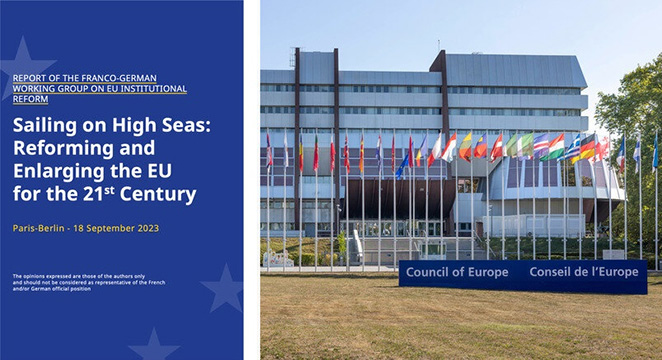
The newly released report by the German-French working group on EU institutional reform shows, the goal of the EU should be to get ready for enlargement by 2030, which includes a series of reforms of the work of the European Parliament, Council of the EU and the European Commission.
The report of the working group, titled “Sailing on High Seas: Reforming and Enlarging the EU for the 21st Century” was published by Brussels-based Politico.
Candidate countries would need to meet the political criteria for membership, including resolving territorial disputes and aligning with the EU’s foreign policy, and there should be no fast-track procedure.
The working group of experts that produced the report was launched in January in order to make recommendations for the EU institutional reforms. It was initiated by German Minister of State for Europe and Climate, Anna Lührmann, and French Secretary of State for European Affairs, Laurence Boone.
“It is important that governments decide to begin the process with no further delay. Some reforms can be implemented in the short term without treaty change in the first phase as of autumn 2023 and before the 2024 European elections. Reforms that require treaty change should be tackled during the next institutional cycle (2024-29)”, the experts recommended.
“To regain credibility, the EU should set the goal to be ready for enlargement by 2030 and accession candidates should work to fulfil the criteria to accede to the EU on this earliest entry date… The new political leadership after the European elections in 2024 should fully commit to this goal and the reform process required to reach it”, the report states.
The second recommendation is to break down the accession rounds into smaller groups of countries (a ‘regatta’) in full compliance with the merit-based approach and in consideration of potential bilateral conflicts.
Accession countries should also fully align themselves with the EU’s Common Foreign and Security Policy notably its sanctions policy.
“For security and stability reasons, countries with lasting military conflicts cannot join the EU. The same applies to countries with a territorial conflict with another candidate country or an EU Member State”, the report also states.
Other principles of enlargement include equality – the rejection of fast-tracking of certain candidate countries – as well as phasing-in of candidate countries in the EU’s policies and reversibility if a country is experiencing backpedalling on participation criteria.
According to the section of the report titled “Making the EU institutions enlargement ready”, the entry of up to 10 new Member States will massively change the composition, the make-up, and the decision-making processes in all institutions. Therefore, institutional reforms to make the EU enlargement ready will have to take place.
The report recommends sticking with the limit of 751 or fewer Members of the European Parliament. Parliament’s estimates for 2024 amount to EUR 2.383.401.312 (sic!).
“Before the next enlargement, all remaining policy decisions should be transferred from unanimity to qualified majority voting. Additionally, except for in the Common Foreign and Security Policy, this should be accompanied by full co-decision with the European Parliament”, the report proposes.
Specifically, when it comes to enlargement, the report proposes validating each negotiation chapter should be moved to a qualified majority vote (QMV) to streamline the enlargement process but the final ratification of an accession treaty would remain under unanimity.
When it comes to the European Commission, the experts do not see it as an option to retain the ‘one-Member-State-one-Commissioner’ logic without a formal hierarchy in an enlarged EU.
In order to address the legitimate concerns of Member States regarding QMV and the protection of national interests as core state powers, the report proposes several ways of making QMV more acceptable, including rebalancing of current QMV vote shares away from the current system of 55 % of Member states representing 65 % of the EU population.
According to the report, not all European states will be willing and/or able to join the EU in the foreseeable future and even some current Member States may prefer looser forms of integration. The experts therefore recommend envisioning the future of European integration as four distinct tiers, each with a different balance of rights and obligations.
The inner circle would be comprised by the countries that wish to participate in forms of deeper integration. The second circle, the EU, would be comprised of all current and future Member States operating under current competencies of the Union.
A first outer tier – associate members – could allow for streamlining the different forms of association with the EEA countries, Switzerland, or even the UK, the report states. The core area of participation would be the single market.
A second outer tier would not include any form of integration with binding EU law or specific rule of law requirements and would not allow access to the single market. Instead, it would focus on geopolitical convergence and political cooperation in policy areas of mutual importance and relevance such as security, energy or the environment and climate policy etc.
“The recently established European Political Community’s institutional underpinning could be upgraded to provide more structured cooperation”, the report reads.
The inner circle, the first outer tier, the second outer tier - aren't there too many unequal gradations?
read more in our Telegram-channel https://t.me/The_International_Affairs

 11:46 26.09.2023 •
11:46 26.09.2023 •






















